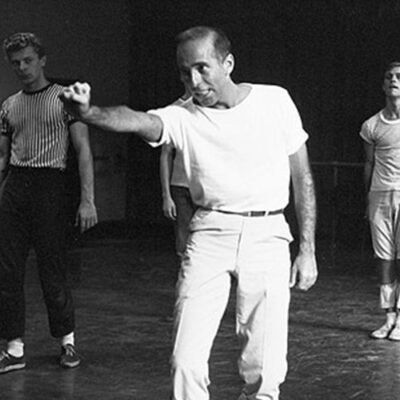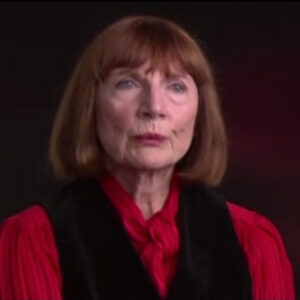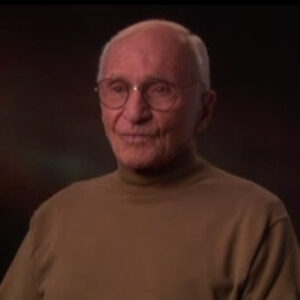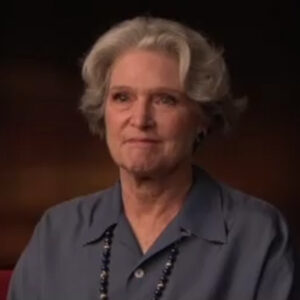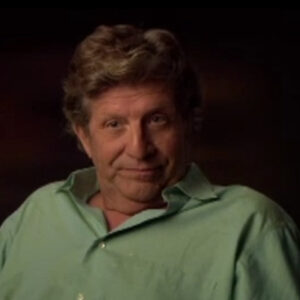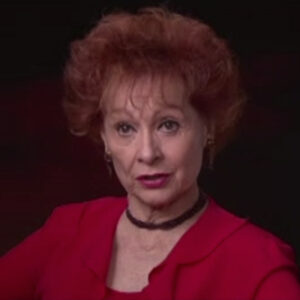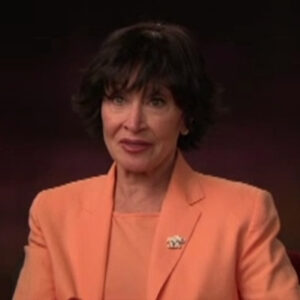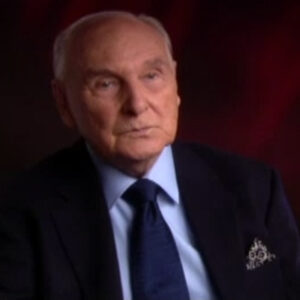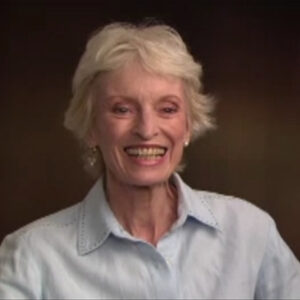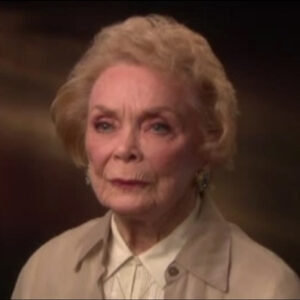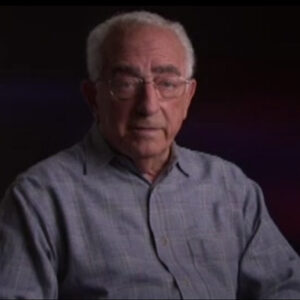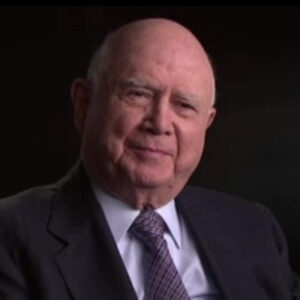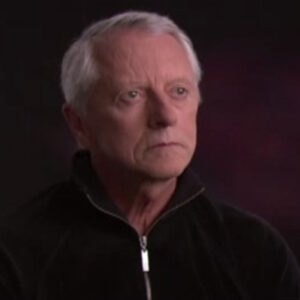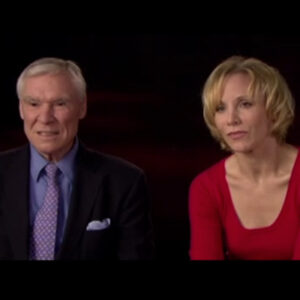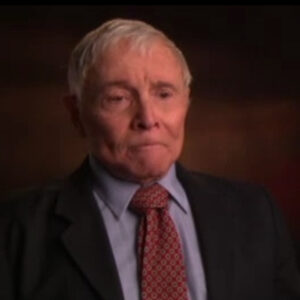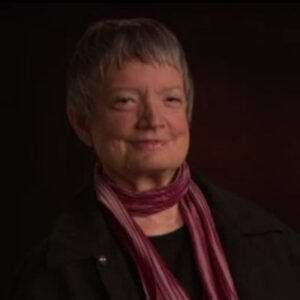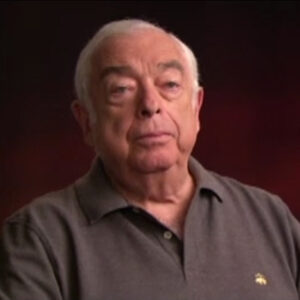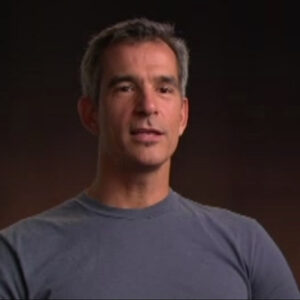Speaker So why don’t I start by asking you, what were the circumstances in which you met Jerome Robbins?
Speaker I was in a show called Seven Lively Arts, which was my introduction to the theater. It was the most spectacular introduction to the theater. It had battler Billy Benny Goodman and his sextet. It had Dark Rockwell that had many ernan when Billy anyway just had rooms of people. We had 16 showgirls. And I mean, it was just jam packed. We closed in six months. Jerry was doing interplay. We didn’t know the title of it, but he knew it. And he as a courtesy, he decided to audition the dancers in case he would take one. While he was crazy about me, he loved girls with straight hair and bangs. He had one. Annabell Gold was one that was in on the town and Alan McLeary was another one that was in on the town and me he loved. But of course, I was no dancer. I would have broken both legs had I done interplay. I can’t imagine how I could have done it anyway. He didn’t eventually use me use BOŞTINARU instead. Wise choice. That was in like June. I went off and did a show called Strauss Goes to Boston and should have stayed there. Yes. And I met Carolann, who was my great partner for years, and I came back to New York and I was looking for a job and he was auditioning Billion Dollar Baby. So I went to the auditions naturally and he said. Don, I know you, and then he remembered me from both on the Town Audition and Interplay audition and I said yes, and he hired me and that was probably the happiest day of my life. I loved working with him. He was just you know, the thing about Jerry was that was so wonderful was when he was in the audience, you always knew it because he’d laugh and most choreographers don’t. Bob Fosse, for instance, wouldn’t wouldn’t give you a compliment under pain of death, where Jerry would give you criticism, no doubt. But he would also say good job tonight. And we loved that. You were in on the town where, you know, Alan and McLeary was in on the town and you were never know? Well, I was I did some stock version of it.
Speaker Tell me about your audition for Million Dollar Baby. What do you remember?
Speaker What I remember, this is a strange thing to remember, I was standing in the wings and we were all trying to figure out how to do the charts because none of us had ever done the Charles River ballet dancers and we were trying to get our feet to go crosswise. We didn’t know what we were doing. And I looked across the stage and there was this girl in a purple swimsuit with red hair piled up to here. And I thought. I like her, I’ve got to get to know that woman, and we became roommates on the road and we’re still friends, she lives Cadigan for me, a woman named Virginia Gibson. And we came up in the business together. That’s what I remember from the audition, trying to do the Charleson, which I didn’t master and meeting Virginia.
Speaker Do you have any recollection of Jerry?
Speaker No, I don’t remember. I guess I was traumatized.
Speaker What was a million dollar baby about?
Speaker Gangsters and their malls. It was it was definitely about gangsters. We had this wonderful crossover where we went to a funeral for a gangster. We all had black. Veils on and we were doing grins and bumps going across the stage, and it was about the Prohibition era where bootleg whiskey was made and we were involved with all those gangsters.
Speaker I remember Mitzi Green was in it and she had a gangster and David Burns was one of the gangsters and Billy Tabart was in it.
Speaker He was the love interest of Joan MacCracken and Joan. He was wonderful in that show. And that’s what I remember now. But I remember the dancing. I mean, that Charleson was something else.
Speaker And we worked so hard on it because now, years later, he Jerry did this, what was it called? Jerome Robbins on Broadway. And I went we were called in Sandra Lee and myself and a few others, and it was still living on the planet to see if we could remember some of the choreography in case it wasn’t right. And I remember a few things. I remember that you hit the cooks this way with your arms going up because they were doing it that way. And then I worked with somebody about the position of the body because we always were told to be in that real sophisticated slouch that they used in the 20s. And I said to Jerry, there’s something that’s very different about the way these dancers do these numbers. He said, yes, that’s the way they’re trained. They’re much more facile. We could not do the Charleston. I mean, we literally had to work. Now, there’s something about choreography that if you have to work at it, it makes it much more interesting than if you can just do it. And they would just sort of doing it because they’d all done those steps since, you know, kingdom come where we had never done them. And so it was it was it was a really a trip and a half because he left a stamp on me that I think I still earn money off of. He taught me things that nobody else talked about. He was many times rather difficult, to say the least, and he would strip you naked practically. He would just pull pull the flesh right off your bones and then rebuild you. And so what, you ended up with something more than what you would have had had. You just started with yourself. He had that trick.
Speaker Do you remember him specifically in the rehearsal process? Can you be specific about.
Speaker Well, what I remember most in the rehearsal process was his going into a black funk. He had this way of when he couldn’t get the choreography to come going down, really down into an abyss someplace, and the it was it was tangible and it was so depressing. We’d all who always had a scapegoat. Fortunately, it wasn’t me that we fought. I mean, I always fought with him, but we would always say, oh, yell at somebody, just do anything, do anything so we can get out of this position that we’re in. And sure enough, he would yell at somebody and up would come. The choreography would just like an eruption and then we’d be having a good time again because we always love you know, we were like he was only about 27 when he did that show and we were all 19, 20. We would all go out afterwards. We’d rehearse, and then we’d go to Coney Island and play on the rides or go to Jones Beach. And so we were contemporaries. So it wasn’t like he was a big choreographer and we were just little dancers. He was just right out of ballet theatre that time.
Speaker So there was a kid. Why do you think people I mean, you’re not the first person to say that he was difficult in rehearsal. Why do you people put up with that?
Speaker Because what he gave you back, I mean, you only worked with him for six weeks. You may do his choreography for you year. And it was so much fun to do. It was always a challenge. He always worked that you never could just come in and phone it in. There was that was impossible. You always had to continue to work, which was what being a dancer is all about. And it was just fun. Everything he did was fun. He was fun.
Speaker You’re quoted as saying that it was difficult to be with him because he couldn’t initiate. Could you explain what you mean?
Speaker I don’t remember saying that, but he was rather shy man in his own way, and I was rather shy. So you needed somebody like Sandra Lee who could you know how I judged. And I couldn’t I would wait, you know, for somebody to involve me. And he would be waiting for somebody, one of him. So it was never an easy relationship. But I was one of his dancers.
Speaker In fact, when he was doing a roundabout for a while, he did it on Broadway, but then he was doing it for the New York City Ballet. He called like five of us in Jacques-Edouard Me and about three boys. And we worked on it because we always did that with him before he did hot button issues. We were in the studio, his dancer teacher, and I can’t not remember her name, but she was on 56 Street and Sandra me and. Was Sandy involved? No, he wasn’t involved in that. George and myself, Arthur Partington and two other boys and we would work he would just choreograph on us, just use us. And which was great, you know, I mean, it sounds like we should have been, you know, paid you couldn’t pay for what he taught us and he gave you something that nobody else was about to give because he was always very intrinsically involved with what was happening to the person that was dancing. It wasn’t just a body. Unlike Balanchine, for instance, was only the body. He was involved with the person he wanted to see that. And so that was fun to do.
Speaker By the person, you mean the person or do you mean the character, but you are the character.
Speaker There is no separation between that. I mean, it’s you doing his dance. So naturally, this character involved, but it’s you that’s doing it. That’s he always hired very individualistic dancers. He didn’t hire just people that would blend. He had particularly built up baby. I mean, that was the strangest group of people. And Hutchinson, I mean, you would never thought that she would have been able to do what she did. Virginia Poe, Virginia, myself, a girl named Lorraine Todd, who was like a Latin Quarter dancer. She wasn’t really a like a ballet dancer like we all were. But he like people. He liked different kinds of people. He needed that because his dancing was involved with people. It wasn’t just addicts. It was those people doing those patterns and humor. Very important part of it, humor.
Speaker Tell me about that, how did you deal with humor on stage? Was he did he give performance a lot of latitude or was was he very strict about timing?
Speaker Oh, timing was everything, I mean, we were tied to the music, so the timing was there, but he encouraged you. I don’t mean he used words like be yourself, but what you did, he liked, you know, and he would reward you for that. And he used to call me Pavlova with the six fingered hands because I have a lot of tension in my hands when I dance. He’s just so funny. But he never said, don’t do it. He just allowed me to do it. You know, my hands were very expressive, so. You know, after all, we’re now talking about, what, 60 years ago, so my memory is it’s just that I can see his Cheshire grin and the fun we had with him and he’d give parties. He lived on Park Avenue there and this little jog and we’d all go to parties there and have fun. He was just full of fun, you know.
Speaker Did he share with you the kind of research that he did for a billion dollar baby, not the baby?
Speaker No, because that was the first time I did. But for high button. Yeah, we went to Forty Second Street and looked at all the old movies. We just at midnight, we go there to hunt down because he was very excited about it.
Speaker So don’t want to skip. No. Well, no, because I really want to ask you about. OK, but he you weren’t it he didn’t share his research on Billion Dollar Baby. Not that I can remember. No. All right.
Speaker How was he? You worked a lot. How was he different from other choreographies you worked with?
Speaker I worked with first rate choreographies. They seemed to be gone. But I work with Agnes Dimel, Helen Thomas, George Balanchine, Eddie Kate and Gower Champion Bob Fosse.
Speaker So I worked with the best. So they’re all very individualistic. It’s just that I enjoyed his work more than anybody else’s. It seemed to use more of what I was. I had kind of very angular body. You know, I could get in strange positions, unlike now when my back is killing me. But and he liked it. He liked the grotesqueness of it in a way. And he used it. He used the angles. He didn’t want to look just pretty pretty. So that was just up my alley in a way. And he hated people to Mugen because he was the worst mugger in the world you ever saw him do through virgins and a devil. It’s down to the corner of that vitamin chewin apple, but he would always say, don’t mug. And of course, a lot of his dancing was about mugging. You know, no facial had a lot to do with it.
Speaker Tell me about the Charleston. What do you remember about him making it how he constructed the No.
Speaker I just know we had we’d always stand in the wings counting one, two, three, four, 254, 13, two, three, four we came out on so we had to count it every night because otherwise there was no like, you know, whatever. And you came on with from the beginning, we had to count down and we walk very tight and we hit a pose. Well done. But I don’t really have much memory of how he worked. I guess I was so involved in trying to do it that.
Speaker I wasn’t observing it, I was sort of embroiled in it.
Speaker Did he demonstrate in rehearsal?
Speaker Oh, yes. Oh, yes, you always demonstrate. And he used other people. I think he used. Was it Imogene Coca? For baby, he he brought people in that would give him something. I think it was Imogene Coca that he used. And now you know what? She was comic. So but. He said he would use anything that would work, you know, pull it out of the sky if necessary, but. I remember sitting and watching him work with and Hutchinson and Virginia Powell, who was like a long drink of water, very pretty, and him doing drinking things. And Maria Haratin played a ukulele. And the three of the three flappers that was Toddy and myself and Virginia Gibson. And he loved the fact that Virginia could sort of when she winked, she just dropped one eye and he loved that, but.
Speaker I only know that when he he cast me, there was ballet in the second act called well, it’s ballet between the gangsters in the malls and Joan was in it and her lover was Jimmy Mitchell. They were dancing anyway. He cut me out of it and he put Lorraine Todd in. And I remember sitting in rehearsals with the kid. I was crying, just sat there crying and he’d come over me, needs a Helen. I only cut you because you look too young. I wouldn’t talk to him because he cut me out of the ballet that comes from kids get very upset when they can’t. I would be upset in those days. You cut me off, I’ll have a crossover. You just had to be on the stage.
Speaker You said that he gave you a college education.
Speaker Remember any of these quotes, a college education? All I know is that he he gave me information that I have used ever since. I can’t tell you what it is, but it affected me. He changed me as a performer. He really did. He gave me some sense of myself, particularly usually in the humor part with my body that I have always used since then. I did a number in his a flag called Florida Moapa Song. That was what I had learned from him. I did. I mean, all these kind of grotesque kinds of things that I did with my body. And I learned that from Jerry. He just he could use that. He would take qualities that individuals had and exploit them.
Speaker Do you have a sense Billion Dollar Baby was not his most successful show?
Speaker Look, it’s always the book, the music wasn’t I mean, it was Morton Ghoul’s, I was pretty, but it just. The story really never caught on, and the leading lady ended up dying at the end, I think. I don’t really remember, but something like that, she threw all her jewels away. McCracken and I think she was killed at the end anyway. Wasn’t like in those days, the kinds of musicals they had were happy, happy musicals. You know, this was not one of those was funny, but it was it was odd. Morton Gould music alone would make it odd. You know, these very.
Speaker Not you know, the sounds were strange for a musical.
Speaker There are lots of versions of the story where Jerry fell off stage, tell me, you know, I don’t know whether I was there or not, but I swear I was. But, you know, the imagination goes. You hear a story long enough, you think you were there. I just remember we were at the Martin Beck Theatre and he started walking backwards and nobody stopped him. I think we were frozen in fear, but I don’t know, we just let him go into the pit. Now, some people say that was on the town. It was baby, so when I was there, we were rehearsing the Charleson and he was going to demonstrate something and he moved backwards and went into the pit. It could have killed himself.
Speaker What was the response of the company?
Speaker Well, I think we lost we couldn’t believe our eyes, but a lot of people were not too unhappy about it because he he he was very hard on his dancers, very hard. You know, he he danced until you dropped, but I just didn’t. I like harsh, you know, harsh teacher says to me that they care somebody that’s easy going. I go, they don’t give a damn. But with him, I knew he cared. And that meant a lot to me because I cared a lot. And so it matched and I was just appalled.
Speaker The fact that he was going into things like, man, that kind of thing. But I don’t remember what happened after how he came out. It obviously didn’t hurt himself because we never missed any rehearsal period of time. But I swear, I was there when it happened. But people tell me and I’m in town, I said, no, I wasn’t, baby. I remember. And it was the Martin Beck Theatre where we were rehearsing because we would rehearse the stage. They would give the choreographer the stage and Abbott would take the actors out into the vestibules and rehearse, which is kind of rare today. They the actors take the stage and the dance around in some studio someplace.
Speaker Tell me about Abbott. Who was he and how did he and Jerry relate?
Speaker Abbott was one of those people, I adored him, but he he just he had no time. For sentimentality, none whatsoever. If he thought somebody should be replaced, the person was standing in the wings while the other person was performing, watching the performance, and they were going to take it up as though he was ruthless about what was right for the show. And of course, in the long run, he was right, because if you’re very kind and save a job for somebody and the show goes well, then everybody’s out of work. He was he was very ruthless about what he did. And somehow, Jerry, listen to him. Well, he was young and it was then he must have been in his 50s, maybe more, and Abbott just said. George Abbott didn’t influence anybody.
Speaker He gave orders and he didn’t he didn’t question would you like it was do this, do that. This has to be done by now. If you don’t, that dance number is not right. Fix it. It was that kind of he was a very authoritarian and and yet he recognised Gerry’s talent because he had used him in the town and now he was using them baby. And later on he used, among other things, he called them in on. Funny thing happened on the way to the forum. You know, that story about how the show wasn’t working? It was working for me. I saw the gypsy run through and it was fabulous, except they felt the opening didn’t work. So Jerry came in and this is what he did when they said curtain up, the curtain fell down on the floor and that was Robbins. That’s the kind of sense of humour we had. I mean, it was hilarious. So and started the show, right? It started with and that’s why Abbott always trusted him, because his humor was just so on the head.
Speaker It was just and he just told him and I think that was good for Jerry because Jerry Jerry would play forever.
Speaker He the story of what he did in West Side Story when he was putting the movie on, they fired him because it just took too long. They were spinning multi dollars because he was playing, because to him it was all about his work. He didn’t he didn’t care about anything else.
Speaker So Abbott did he was the the head of the ship. And it was going to move in the direction that he wanted it to. Dancers were cut. They were left in this, had to go in there, he told them. And I think in a way at that stage in Jerry’s career, he needed that because he had to be restrained from his own talent. In a way, an Abbott could do that better than anybody else.
Speaker Do you think that influenced Jerry for later when he was the director?
Speaker I don’t know. Having never worked with him later, I can’t say, but I’m sure it had to. That was his formative years in the theatre. He had just come out of the out of ballet theatre. So his initial impression was the Motown. And that was appart he directed that and then baby and then high button shoes.
Speaker Did you see Jerry when he was Ballet Theatre? Oh, yes, very much so. About him. And he was dynamite.
Speaker Well, all three boys were I first when I first saw Harold Lang, I said, I’ve got to dance with that man. And I did my very next show. And Robin’s it was like, but did I know Robin’s before? I said no, I don’t think I did. I don’t think I had worked with him. Of course not. So was before. He just he was dynamite on the stage. Just I mean, he lit up like a Roman candle. He was just all oh juice. Just very juicy performer and great dancer. The nobody’s ever touched those three guys and fancy free as far as I’m concerned. You know, Harold, I adored and John Cleese was wonderful and Jerry was just him. He was himself a mistake. See, that’s what I think he gave me. He was always himself. He didn’t take on the attitude of anything. It was him in that he was that way in two virgins and a devil to. It’s wonderful. I was just I can remember sitting in the Metropolitan Opera watching that ballet. Mm hmm. It was there’s nothing like it today, nothing.
Speaker Tell me about.
Speaker Just just I mean, everyone was an individual, that’s what I liked about it. It wasn’t like dancers doing steps, Muriel Bentley and Shirley Eckle and with their three girls.
Speaker And I think there were only two girls, Johnnie, Chris and Harold and and Gerry. They were just so individual that they weren’t they didn’t fit in any form. It wasn’t like they looked like ballet dancers. They looked like people who happen to be able to dance very well. And that that’s what I think Jerry wanted. He wanted human beings on the stage as opposed to what the boundary line, boundary line and musicality and and and his choreography. Jerry liked people doing his choreography. And he got you to be a person. I mean, he wouldn’t settle for anything less.
Speaker What do you remember about that? What do you remember about his performance, Jerry? Particularly in three Vergennes he mugged.
Speaker That’s what I remember. And later on, when he said, don’t mug, I thought, this is the same man that did the devil telling me not to mug because he was a ham on stage, a total ham.
Speaker Wonderful.
Speaker Just what would you say that he was more of a realist or a perfectionist? Both. You give me an example. I make it if I can incorporate a perfections.
Speaker Well, he was a perfectionist. He worked until you dropped. I’m about in in rehearsals for when he when we were working on High. But I had I was an asthmatic. I fainted on the floor and he went, oh, well, he just got carried away, you know, he just he just wasn’t just he was working. He was working himself, too. He just wanted to get it, get it right. So. Oh, he was a total perfectionist.
Speaker Do you have a sort of best recollection of him, you said something like that. I read it was a joy to work with him.
Speaker So what’s your most joyous recollection of his work?
Speaker It was fun to do. I look forward to going to there every night and always wanted to improve it.
Speaker I remember he came back and baby and it was embarrassing me to say this, but he said, now Helen’s the only one that’s working on this number, which endeared me to the rest of the company. You can imagine, but it was just that he was such a challenge. So there was a position that you had to get into this cause I didn’t have the sophisticated slouch, debutant slouch. And I would do it to the point where I was in a pretzel position practically just because he he wanted that. And that was fun for me. I don’t know why, but it was it was just we’d come offstage. Mr. Green would always laugh because the three of us would come off and always discuss the number. And some nights we didn’t like what we did. And some nights we were congratulating ourselves. You say you three hands because we were always talking about the dance. That’s what he did to you.
Speaker What’s your worst recollection of those black moods that he’d get in?
Speaker Oh, just like somebody put a hand on your head and was pushing you into the ground. It was was absolutely oppressive, but it was I recognized that it was part of his creative process. It’s the thing he did in order to get the choreography to come up and out. I’m sure there’s an easier method, but that was his method and I didn’t really question it. But it wasn’t a lot of fun to be around because he could be mean. I mean, as a snake. But his choreography wasn’t me.
Speaker Can you give me a specific example?
Speaker How many could be? Well, he always had a scapegoat and there was maybe it was a guy that was and had do this part and he was just owe me anything. He would say anything, denigrate anybody. It was just it was awful.
Speaker But as long as it wasn’t you, it was a lot better. But I fight with him.
Speaker I would fight with him all the time. I don’t know where I got the gumption to fight, but he was just like, come back at it. And I think you like that because it made him less of a villain if somebody would battle him.
Speaker Can you give me a specific example of that?
Speaker No, I told you he used to call me the six fingered hands, which was not a compliment.
Speaker It’s just that he was he he wanted the way he wanted it, and if you weren’t using everything that you had to get there, he would just tell you that was terrible. And one word from him, you’d be crushed because you wanted his approval naturally. And I was young.
Speaker OK. High button shoes. Yes. Please describe it for somebody who’s never seen.
Speaker Well, let’s say what was high button shoes about. It was not about the plot, though. There was a plot. It was about a small town family. And I was the maid and Paul Godkin, who only lasted maybe three weeks or four weeks. I don’t know why he quit, but he was the original Uncle Willie. And Nanofibers was the mother of the family. And it was a young boy named John. And I can’t think of his last name and Jack McCauley, who was great. And then into this town comes this con man, and it was Phil Silvers. And he had this I’ll take to routinely they’d set up, you know, substring people. And somehow he got her involved with her Gleek of raising some money and he absconded with the money. This is Phil Silvers to Atlantic City. And then we all showed up in Atlantic City looking for the money in that valley, the mack about. I have never heard such a laugh in my life since before when that gorilla came through the door. I mean, it was like a blow. We were at the Century Theater, which is no longer exists. It was on fifty nine Street and 7th Avenue.
Speaker And when that gorilla came out, because we’d all been running frantically through doors. Now I’ll give an example of Jerry. When we were out of town, people were crashing into each other because we’d be running through the door. I mean, hitting Sandra was hit so hard she she went out and people just jumped over her body and went through the doors because we had to be on count. Otherwise it would have been a catastrophe. So we said, Jerry having terrible problems backstage. He said, all right, we’ll do it tonight and I’ll see what I can do about it. And he stood where his head was. Him could see what was happening backstage and palms gazing and laughing.
Speaker He was laughing, just laughing.
Speaker And then the next day he said, just keep to the right. That’s when we knew of what to say. But he wanted to see the chaos because it was fun. Anyway, he solve that problem, keep to the right and that from that point on, we weren’t killing each other.
Speaker So tell me again about Sandra, was she what she fainted or she she was knocked out, literally knocked out because somebody hit her so hard trying to get to the doors because we’d stand back there and on counts, we had to go through these doors and we’d just stand back and got a high water if anyone was in your way, get out of my way. And she was hit and she fainted, which is literally the air was knocked out of another time. She fell off. She used to go off backwards off the pier and she hit the ground. It was very dangerous choreography, but it won’t happen that time. But this time we just jumped over her body, you know, that she was backstage between the doors and everybody just jumped over and went out their door.
Speaker What do you remember about him making this? This must have been incredible in the.
Speaker Well, see, now the tragedy of me, I had come out of a I was in Brigadoon and Jerry said to me, Helen, I’m doing a new show. There’s nothing in it for you. But would you like to go into a studio and rehearse? I said, I’m there. So we went to this dancing school teachers and I cannot remember her name. And we worked for maybe a week. And the day I was to go back because I was on vacation from Brigadoon and which was the first time they ever gave vacations, and the trick was that they were going to give this vacation so that they would keep the company together. I came back and handed my notice in. You have never seen the shit hit the fan at night. But anyway, I was cast in the part of the made by Abbott, not by Jerry. Jerry wanted Jackie Dodge to get it. And I was no, no Gallagher. So I got a part. But unfortunately, as much as I loved doing the part that cut me out of all the things I wanted to do, I couldn’t be in the soft shoe and I couldn’t be in the picnic ballet. And I was just heartbroken because I wasn’t in on the choreography. So that’s why I’m so limited as to what went on, because the way that Tango got in that show is remarkable.
Speaker We had this number to do. And, you know, you’ve heard of Glocke Sándor, Jerry’s great teacher, and he had him around as an assistant and Jerry didn’t.
Speaker Jerry and Paul Godkin did not get along. They had both come out of ballet theater and they were very competitive. Well, Paul Godkin was the one that I was working with, so Jerry didn’t want anything to do. He’s busy working on the soft shoe and the picnic ballet, which was his fetish. Jackie was. And he loved it and very long legged. I couldn’t blame him. She had beautiful legs. And so he was working on that. He couldn’t care less about the tango. So we had this little scene and then we would go into Gloc. Sando would take us down in the basement someplace and create the steps, sort of maybe four steps and we’d get there and then. So, Jerry, it is so avid, says Jerry, the day we were leaving town, Jerry, is that no finished yet? Jerry said no. He said, well, then it’s cut like that. Well, I was heartbroken. I had just quit a job to be in this thing. And I thought, oh, there goes my job. And I saw it. And he said, no, Gallagher, you’re not going to be fired. You’re going to do the scene and you’ll go into the dance without any music. You’ll just do it because he was supposed to be teaching me the tango out of a book and and then Nannerl come in and interrupt you, and that’ll be that. So we got out of town. That’s what we did opening night and when and came and interrupted. The whole audience went, oh, because it was very interesting what we were doing. So the next day, sure enough, the number was going back in. But the reason it was going back in was because Nande needed time to change your costume. That’s the only reason it was going back, I thought, was because we were so glorious. So. Four o’clock in the afternoon, Abbott comes up out of the basement where he was rehearsing and he said, Jerry, you finished that number yet? And Jerry said, no, I haven’t had time. He said, well, you finish it or I’ll finish it because it’s going in tonight because he had already changed. OK, it’s six o’clock. Jerry dismisses the company and in 20 minutes he stage the number. Fortunately, the number was two people that didn’t know what they were doing because they were reading out of a book where literally we hit that stage that night and we didn’t know what we were doing. I couldn’t remember which step was coming when when he didn’t know. And we were looking at the book, he was looking so and stop the show. So the number was in, but that’s how it got to be. And in 20 minutes, he stage that number. Paul Goken always claimed he didn’t stage it, but he did. He took the two steps that and I had done and added it on and ended it that quick because it was a cinch for him to do that. And it was so easy. That’s why he didn’t want to be bothered and also as Paul was in it. So I had nothing to do with any of the choreography except I’d run through a few doors. And in the in the mix, it wasn’t that.
Speaker Give me a little set up for the next Senate battle. What exactly was it?
Speaker Well, it was it was a takeoff on the Keystone Cops from the old movies.
Speaker Sorry. Yes. Problem just just just one. Well, sorry can start again.
Speaker Yeah, it was a takeoff on the Keystone Cops, all the Maxin ballets. So we we’ve done a lot of research.
Speaker Let’s go back. Go back one more time.
Speaker Start the back of it was a takeoff on Maximon, what he had done and we had done a lot of research, we’d go to these late movies on Forty Second Street, Jerry and his crowd, five of five of us, and we’d watch and that’s what he got it from. And so it was intertwined in the story, in the fact that film service was running away with a bag with all the money in it. And we were chasing and we came excuse me, and we came down to Atlantic City, the whole crowd, the whole show, in order to get that money back because it belonged to whoever had given it. So. The chase, he he managed to get himself into these bathhouses and we were all chasing him.
Speaker The cops were chasing him and the three the the crooks made up. Did you ever see it? Unbelievable. Baby girl. Mommy, daddy, crook. And and then the Keystone Cops and the peanuts was the baby cook. And there was it was it was the end of the ballet was really gay present, you know, where I found it on.
Speaker And it was hilarious. But when that gorilla came through that door, I have never heard a laugh like that in the theater before or since. It was just it was like it was like a blow to your body, the laugh, because that was now it wouldn’t get that kind of a laugh because people expect things like that. But in those days, that was the strangest thing to say. So we were all going from doors like crazy on clowns, Schoenman and all of a sudden outcomes. This girl is or is.
Speaker Jerry said that you.
Speaker Jerry said that for period dances, he would first get the style right and then distort it so that it wouldn’t be boring. You explain what he meant by that.
Speaker I think it’s a trick choreographers have like.
Speaker If you think something’s going to go to the right, they’ll put it to the left so that the body has to go through something more than it would if it was Fassel, that’s why that show was so interesting, because none of us had ever done. I’m telling my baby now had ever done Charles. We we couldn’t get our feet to do that. Now it means nothing. But then it the tension that the body had to go through just to do it made the dance more interesting. And I think that’s what he’s talking about, making it just a little unexpected. So keep waking up the audience wherever it’s pastoral just goes. Oh, but no, he would always do surprises.
Speaker Tell me about the soft shoe. No, it wasn’t just any soft shoe number, right? I still get jealous.
Speaker Oh, well, that wasn’t the soft shoe, no soft shoe number was a the one that he was working on was with the chorus that was in the first act, which want to tell me what you were talking about.
Speaker There’s a big soft shoe number where the kids danced, and that was one of his pets in the show. He was working forever on that, the soft shoe that Jack Macaulay.
Speaker And then everybody was just a little number that goes with Jealous. I still get jealous. No, no, no. That was it was really a throwaway. I think he did do the staging of Pop to dance and that I’m not sure he did the staging of Jealous. He didn’t always do like he’d send a like a lock or somebody like that to do that kind of thing. But the the the soft shoe in high button shoes was a big chorus number where they all they were the twins. They were always characters, they were twin girls in it. And they came out with umbrellas and they did the soft shoe and they were.
Speaker I remember.
Speaker Can’t remember the characters, but there were different characters that did softshell and was big, it was a big no, he there was something about I still get chills and I don’t know what it is that he loved because he actually unexpectedly put that in Jerome Robbins Broadway.
Speaker And I don’t know why, but I was hoping you might. I don’t know why.
Speaker I noticed when I worked with Jerry that he treated different people differently and you talked about that a little bit before, but you seem to get along with him very well. What was your secret?
Speaker I like to that’s it. I mean, I loved his work, I would I would walked on. I tried to get in his company. I was doing a. Oh, sweet charity, and I auditioned for his company, that famous company that did what you couldn’t even get people to talk about that skipper Damon was in it and I asked her about it was the most painful experience. He was trying to create a new theater because he was very much under the effects of Robert Wilson and he wanted to do something like that. And apparently it was the most painful rehearsal. They were in rehearsal every day for a year. To be with Jerry Robbins for might be a little tiring, but I was willing to quit a hit show to do it didn’t hire me. I was very disappointed. He didn’t use people. Once they got to a certain level, it might have to do with that. He wants you just where he wants you.
Speaker Why?
Speaker Because he could manipulate you better. There’s got to be a personality in your own, you might give him a little grief or something. He always liked me.
Speaker Did you find that he was a secure person and how do you think that manifested itself?
Speaker I don’t know any secure people, do you? I really don’t. He was insecure. Obviously, he was a very complicated man, but in his work, I didn’t find any insecurities. He knew what he was doing, but sometimes he had difficulty getting it to move on up, you know, because the creative process is a very deep labyrinth. And he went deep. And so therefore, to get it to move up, it was very painful to watch sometimes. But he got along with his dancers, far as I could see. Great. We all loved him. I mean, people criticize him, but they still loved him. Some performers say that he brought out the best apps absolutely by forcing me beyond what I would own. That’s what I mean, that’s what I about, you know, it’s like he cleans. He took the flesh off the bone. He did that where he worked. Like what he said. As I said, he could be very cruel. But then he built it back on. He gave you something more and then you would have gotten to on your own. And that was like it was the thing that I was in the business for. I was in there just to shake my shoulders and grin. I wanted to. Do what he wanted me to do, and he made it possible in a difficult way, but nevertheless made it possible and with all of his dancers felt that way in those days, I think you know that different era dancers today are of a different different they’re used to having. I mean, I worked with a book off at the American School of Ballet.
Speaker I mean, my dear, with a sticky door, he’d come up and say, miss you that much lousy right in front of your face was his humor. But at the same time, it was very scary. So we came out of that era where teachers were not kindly and considerate and ready to stroke you.
Speaker They want you to do it. And it was harsh. It was very harsh, but we were used to that. So it wasn’t so hard on us. When I hear kids talk about it now, younger people of whatever, they just weren’t they’re not equipped to face that with me. It brought the best out. I like a little opposition. It makes me come up to the mark. And he gave you plenty of that.
Speaker A drum. I hear a drum, saw something else that we’re OK with that right there. Mm hmm. OK, um.
Speaker Tell me a little bit about a typical robbins’ pre equity rehearsal schedule.
Speaker Well, it was all day killing. I mean, he and Agnese figured out this way how to have well, administered it in class. Jerry just called dancers and say, come, let’s play. Well, I mean, any fool would go. I mean, you were working with the best and it was fun. And that’s why you wanted to do it wasn’t to earn sixty dollars a week, which was what we were being paid in those days. It was to dance and I worked on it. As I said, I’d worked on roundabout with him at the New York City school, which was my school anyway, American School Ballet. But just to get some choreography into the into the mix. And then he went on and did it with the dancers that were going to do the numbers, but. He always did pre pre rehearsal, and in those days, we didn’t think anything of it, we were just delighted that he asked us, you know, I mean, I was flattered when he wanted to work with me. You know, it was just fun. So I didn’t think it was because of him that we have those roles in the book. You know, you can only have I mean, Agnes did the same. She would come to us out of towns like I’ve got to go back to New York. Would you mind working an extra two hours? You did it. You know, now you wouldn’t do it. Probably wasn’t very fair then, but we didn’t know any better, we were coming out of that era, dances were cooperative, you know, we didn’t have strict rules. There was no such thing as overtime. And I kept saying they’d put overtime in the book. They wouldn’t do this because they’d have to pay for it, but they didn’t allow no overtime. That was equity’s rules, no overtime. But they put out overtime and they stopped asking customers. But I never resented it. I loved it.
Speaker Where would you place Jerry in this sort of pantheon of American musical theater towns up there?
Speaker I think even the. He was just very innovative.
Speaker I went to see West Side Story six times, planning to watch when you know, the circle of dance when they were, and then at the end of it, two lovers were there. I wanted to watch how that happened. I never could do it. I would get involved in the circle and then all of a sudden I’d be there. And I think on it, I missed it again because he didn’t want me to see it. He just created it in a way that it would be there. And that’s.
Speaker That’s that show was just unbelievable to me. Can’t do it now because it’s, you know, now they’re killing each other with bullets, but. The choreography in it was just superb. And the performances were just I mean, Chita Rivera has never been better than she was in that boat show, just just great.
Speaker Is there anything that you would like to tell me about Jerry that I haven’t asked you?
Speaker I can’t think of anything else so long ago, I can. Just that he. He really changed musicals in a way, I mean, Agnes changed it with Oklahoma, but then Jerry took it. A step further. Because he didn’t just create dances.
Speaker He he did something to the show. His shows were about. His choreography, you know, it was just I mean, without the take the max, send it out of high button shoes and there is no show, was that that ballet that made it a hit? I’m Phil Service was one of those that was in and Barbara and Jack McCauley. But if you took their ballet out, show, wouldn’t have. My ballet was sheer genius. It was supposed to be in look, mom dancing, you know, originally that’s what he had worked on. That ballet was supposed to be the closet ballet that they eventually did in. But because he did hot button issues before he was supposed to do look, ma prior to high button. In fact, I was sitting waiting because he had said to me, I’ve got a part for you. Don’t take another job. This was right after baby. So I sat for about three months and didn’t come up and I had to work. So it came up the next season. And the part, of course, then he wouldn’t take me on my button. So I never got to know what party wanted man.
Speaker But he he just he had a gift that just was the theater then. The theater was a joyous experience and his everything that he did to me was joyous. It wasn’t the.
Speaker It was in Chicago about death and or Sundheim, about, you know, it was that joie de vivre that he had, he had such a vitality that his his shows lighted up the stage. I mean, it’s like a what was the thing that he did with Merman, not Gypsy, but the one before that. Call me madam. There’s some dancers in that that it just the show just right up.
Speaker Great, great. I love to.

